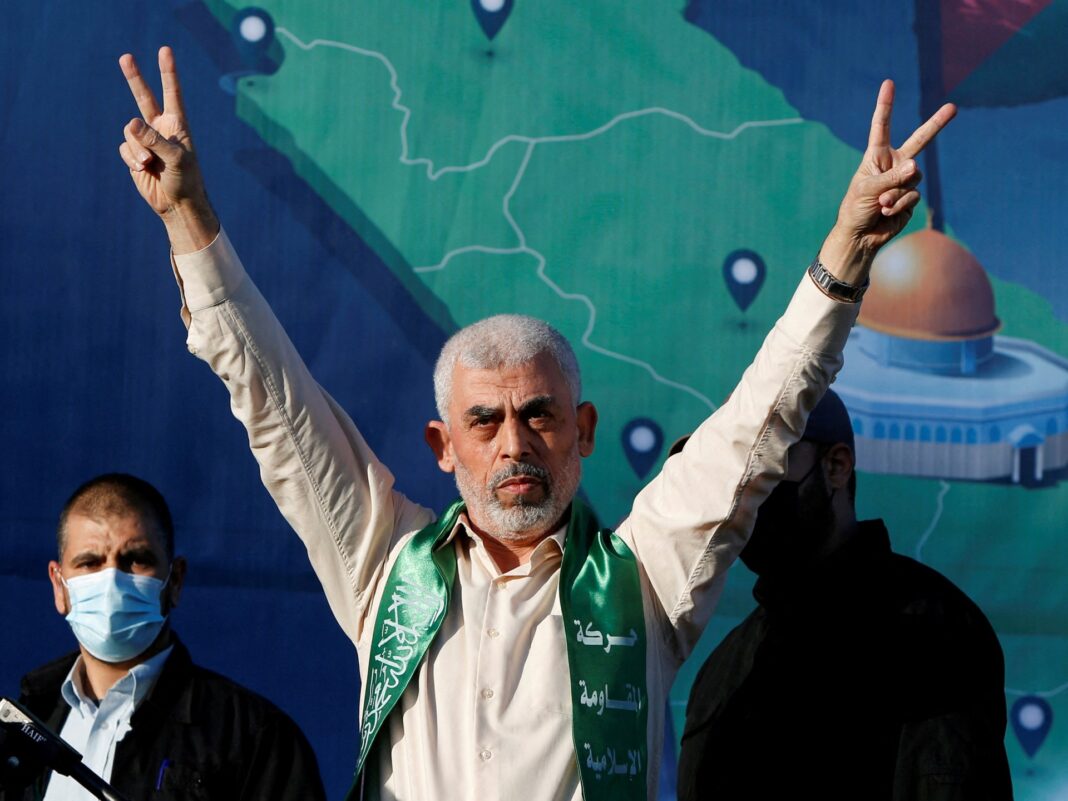Sinwar will now lead the resistance movement from an unknown location in Gaza, amid fears of a wider escalation across the region.
Hamas has appointed its Gaza leader Yahya Sinwar as the political chief at-large to succeed Ismail Haniyeh, who was assassinated in a suspected Israeli attack in Tehran last week.
The announcement by the Palestinian group came on Tuesday as tensions skyrocket across the Middle East, with Iran promising revenge against Israel for Haniyeh’s killing on its soil.
Israel has not confirmed or denied its involvement in the July 31 attack.
Seen as the architect of the October 7 attack against Israel, Sinwar will now try to push the movement through uncertain times across the region from an unknown location in Gaza.
The Gaza-based Palestinian leader is public enemy number one in Israel. So, by choosing him as the head of its political bureau, Hamas is sending a message of defiance to the Israeli government.
But it remains unclear how Sinwar will be able to communicate with fellow Hamas operatives, run the day-to-day political operations of the movement, and oversee Gaza ceasefire negotiations while in hiding.
Israeli officials have made no secret of their desire to kill him.
Born in 1962 in Khan Younis, Sinwar is often portrayed as one of the most uncompromising top Hamas officials. He was arrested by Israel repeatedly in the early 1980s for his involvement in anti-occupation activism at the Islamic University in Gaza.
After his graduation, he helped establish a network of fighters to take up armed resistance against Israel. The group would later become the Qassam Brigades, the military wing of Hamas.
Sinwar joined Hamas as one of its leaders almost as soon as the group was founded by Shaikh Ahmad Yasin in 1987. The following year, he was arrested by the Israeli forces and handed four life sentences – the equivalent of 426 years in jail – for alleged involvement in the capture and killing of two Israeli soldiers and four suspected Palestinian spies.
He spent 23 years in Israeli jail where he learned Hebrew and became well versed in Israeli affairs and domestic politics. He was freed in 2011 as part of the prisoner exchange deal that saw the release of Israeli soldier Gilad Shalit, who had been captured by Hamas.
After his release, Sinwar quickly rose through Hamas’s ranks again. In 2012, he was elected to the group’s political bureau and was tasked with coordinating with the Qassam Brigades.
He played a leading political and military role during Israel’s seven-week offensive against Gaza in 2014. The next year, the United States labelled Sinwar as a “specially designated global terrorist”.
In 2017, Sinwar became Hamas’s chief in Gaza, succeeding Haniyeh, who was elected as the chair of the group’s political bureau.
Unlike Haniyeh, who had travelled regionally and delivered speeches throughout the continuing war on Gaza, until his assassination, Sinwar has been tight-lipped since October 7.
But in a 2021 interview with Vice News, Sinwar said that while Palestinians do not seek war due to its high cost, they will not “wave the white flag”.
“For long periods, we tried peaceful and popular resistance. We expected that the world, free people and international organisations would stand by our people and stop occupation from committing crimes and massacring our people. Unfortunately, the world stood by and watched,” he said.
Sinwar was likely describing the Great March of Return, during which Palestinians protested every week for months on end at the Gaza border in 2018 and 2019, but met a violent Israeli crackdown that killed more than 220 people and injured many more.
Asked about Hamas’s tactics, including firing indiscriminate rockets that could harm civilians, Sinwar said Palestinians are fighting with the means at their disposal. He accused Israel of deliberately killing Palestinian civilians en masse, despite having advanced, precise weaponry.
“Does the world expect us to be well-behaved victims while we are being killed, for us to be slaughtered without making a noise?” Sinwar had said.







